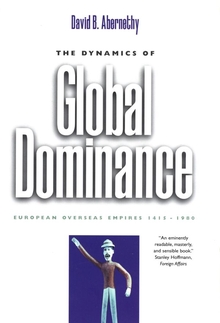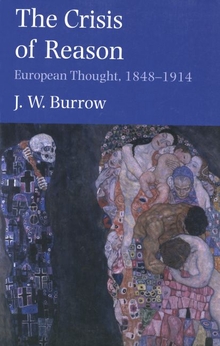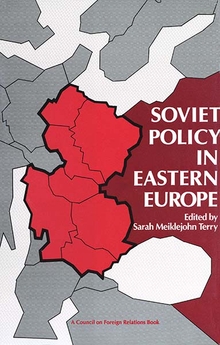The Dynamics of Global Dominance
WARNING
You are viewing an older version of the Yalebooks website. Please visit out new website with more updated information and a better user experience: https://www.yalebooks.com
European Overseas Empires, 1415–1980
David B. Abernethy
For centuries Europeans ruled vast portions of the world, as inhabitants of west European countries sailed to distant continents and took possession of territories whose societies and economies they set out to change. How and why did these farflung empires form, persist, and finally fall? David Abernethy addresses these questions in this magisterial survey of the rise and decline of European overseas empires.
Abernethy identifies broad patterns across time and space, interweaving them with fascinating details of cross-cultural encounters. He argues that relatively autonomous profit-making, religious, and governmental institutions enabled west European countries to launch triple assaults on other societies. Indigenous people also played a role in their eventual subjugation by inviting Europeans to intervene in their power struggles. Abernethy finds that imperial decline was often the unanticipated result of wars among major powers. Postwar crises over colonies’ unmet expectations empowered movements that eventually took territories as diverse as the thirteen British North American colonies, Spain’s South American possessions, India, the Dutch East Indies, Vietnam, and the Gold Coast to independence.
In advancing a theory of imperialism that includes European and non-European actors, and in analyzing economic, social, and cultural as well as political dimensions of empire, Abernethy helps account for Europe’s long occupation of global center stage. He also sheds light on key features of today’s postcolonial world and the legacies of empire, concluding with an insightful approach to the moral evaluation of colonialism.
Abernethy identifies broad patterns across time and space, interweaving them with fascinating details of cross-cultural encounters. He argues that relatively autonomous profit-making, religious, and governmental institutions enabled west European countries to launch triple assaults on other societies. Indigenous people also played a role in their eventual subjugation by inviting Europeans to intervene in their power struggles. Abernethy finds that imperial decline was often the unanticipated result of wars among major powers. Postwar crises over colonies’ unmet expectations empowered movements that eventually took territories as diverse as the thirteen British North American colonies, Spain’s South American possessions, India, the Dutch East Indies, Vietnam, and the Gold Coast to independence.
In advancing a theory of imperialism that includes European and non-European actors, and in analyzing economic, social, and cultural as well as political dimensions of empire, Abernethy helps account for Europe’s long occupation of global center stage. He also sheds light on key features of today’s postcolonial world and the legacies of empire, concluding with an insightful approach to the moral evaluation of colonialism.
David B. Abernethy is professor of political science at Stanford University.
“A substantial contribution that may become the standard way of thinking about the half-millennium it describes.”—Charles Tilly
“[An] important book. . . . The subject is succulent and important, and Abernethy clearly enjoys writing about it. He tells a good story, but with a critical eye for the problems and the literature. I think this book should be (will be) a staple of those courses that deal with imperialism, colonialism, and world history.”—David S. Landes
"David B. Abernethy’s extended exploration is both impressive in its ambitious coverage and path breaking in its rigorous, and much more fully comparative, analysis of some of the central themes in early modern and modern global history. . . . Wide-ranging and often imaginative analysis of recurring dynamics in seemingly discrete historical encounters should prove invaluable to nonspecialists striving to incorporate European overseas expansion and colonial hegemony into courses on early modern and modern global history."—Michael Adas, American Historical Review
“A superb work, a tour de force. . . . No short review can do justice to the huge sweep of this balanced, elegant, and profound book.”—James Rosenau, Comparative Political Studies
“This book contains many valuable insights on the mechanics of European imperial expansion and the descriptive parts should be useful to undergraduates studying the subject.”—EH.NET
“The colossal European attempt at global dominance through imperialism has been studied piecemeal, but overall evaluations have remained few. Abernethy has now produced the most comprehensive account since Michael Doyle’s Empires, focusing on how European empires reshaped the economies, social institutions, cultural patterns, and values of their subjects. . . . An eminently readable, masterly, and sensible book.”—Stanley Hoffmann, Foreign Affairs
History: Reviews of New Books
“Abernethy has constructed an ‘explanation sketch’ of five hundred years of complicated historical experience that deserves an attentive reading from beginning students and accomplished hands alike.”—Donald Lammers, History: Reviews of New Books“This ambitious, systematic, and thoughtful analysis of a vast contentious field rewards careful reading. As his wide-ranging forty-two-page bibliography confirms, Abernethy has canvassed English-language titles in political science, sociology, cultural studies, and especially history in developing his explanation of how Western European states built, sustained, and lost their overseas empires. . . . Abernethy’s bold categories and cautious insights should provoke some well-targeted research and much fruitful argument.”—Journal of Interdisciplinary History
"Abernethy’s accounts and analyses of previous powers provide a much-needed historical perspective."—Troy K. Schneider, National Journal
"This is a block-buster of a book of the very high standard one associates with Yale University Press. Its scope is enormous."—Muriel E. Chamberlain, The History Journal (UK)
“The book is an important contribution to the growing literature on the era of Europe’s global dominance.”—The International History Review
“Abernethy has written a book that should go straight on to any reading list concentrating on imperial studies and the impact of Europe on the shaping of the modern world. . . . Abernethy sets out with clearly defined objectives, and achieves them with an admirable economy of style and clarity. He writes with a detached, masterful authority. He does just what a reader—be he neophyte or specialist—wants: he boldly poses questions, and then rolls up his sleeves and furnishes answers. This book is worth the cover price for anyone interested in the reasons for the rise of the European empires, and their decline. It should become an instant classic.”—Ashley Jackson, The Journal of Military History
“This straightforward account is amazingly comprehensive in sketching and attempting to explain five centuries of world history. It contributes to a rapidly growing literature on European imperialism and the ‘world system,’ a variation on the comparative study of modern capitalism that Marx and Weber pioneered. Abernethy’s book provides a curious blend of traditional social science and multicultural critique.”—Virginia Quarterly Review
“A learned discussion of European overseas empires . . . packed with provocative insights.”—Jacob Heilbrunn, Washington Monthly
ISBN: 9780300093148
Publication Date: July 11, 2002
Publication Date: July 11, 2002
544 pages, 6 x 9
14 b/w illus.
14 b/w illus.








